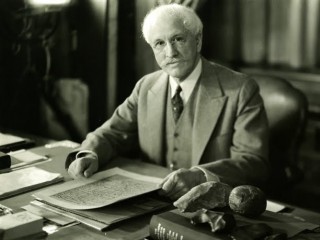
James Henry Breasted biography
Date of birth : 1865-08-27
Date of death : 1935-12-02
Birthplace : Rockford, Illinois, United States
Nationality : American
Category : Arhitecture and Engineering
Last modified : 2011-07-12
Credited as : Archaeologist, historian, Egyptology
James Henry Breasted was born on Aug. 27, 1865, in Rockford, III. He graduated from North Central College in 1888 and attended Chicago Theological Seminary but transferred to Yale to study Hebrew. He received a master's degree from Yale in 1891 and, on the advice of William Rainey Harper, went to Berlin. There Breasted studied under Adolf Erman, who had just established a new school of Egyptology, concentrating systematically on grammar and lexicography. Breasted received his doctorate from Berlin in 1894 with a dissertation on the solar hymns of Ikhnaton. He also married the same year and made the first of his many trips to Egypt on his honeymoon, spending much time exploring, and learning Arabic.
Upon his return to the United States, Breasted joined the faculty of the University of Chicago in 1894 as an assistant in Egyptology. By 1905 he was a full professor in Egyptology and Oriental history. In addition, he became director of the Haskell Oriental Museum in 1901 and chairman of the Department of Oriental Languages in 1915, a post he held until 1925.
In his early scholarly years Breasted embarked on several ambitious projects, one being to translate all extant Egyptian historical texts into English. The Ancient Records of Egypt: Historical Documents (5 vols., 1906) became a standard work and established his reputation. Breasted also wrote monographs and textbooks. His History of Egypt (1905) was the first scholarly history of the ancient Nile written in the United States and attracted much favorable comment.
From 1905 to 1907 Breasted directed the Nubian expedition of the University of Chicago, which developed his interest in Egyptian religious thought. This culminated in the Morse Lectures at Union Theological Seminary, published as Development of Religion and Thought in Ancient Egypt (1912). Here he took an evolutionary posture and traced man's moral ideas from Egypt. Breasted also continued to write texts, alone and in collaboration. The most famous of these was Ancient Times (1916), revised as The Conquest of Civilization (1926). The emphasis was upon man raising himself through intelligence and religious growth.
In 1919 Breasted originated the Oriental Institute of the Near East and directed the first expedition to Egypt and western Asia in 1919-1920. He was released from teaching duties in 1925 to devote full time to the institute, became Burton distinguished service professor in 1930, and retired in 1933. In 1933 he also published his best-known work, The Dawn of Conscience, an elaboration of earlier ideas.
Breasted died in New York City on Dec. 2, 1935, having securely established the study of Egyptology in the United States.
















